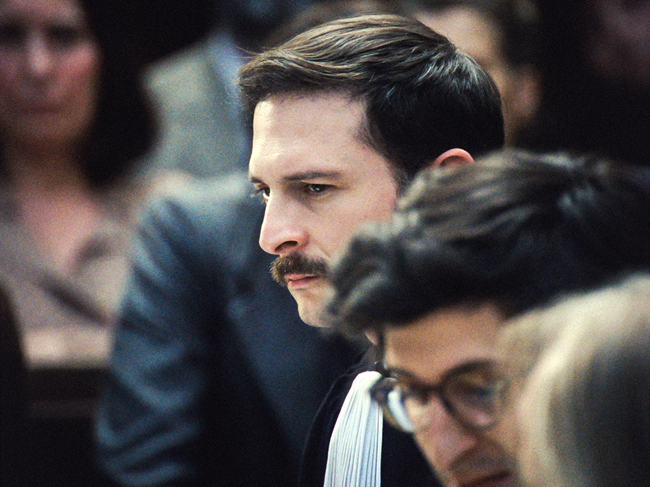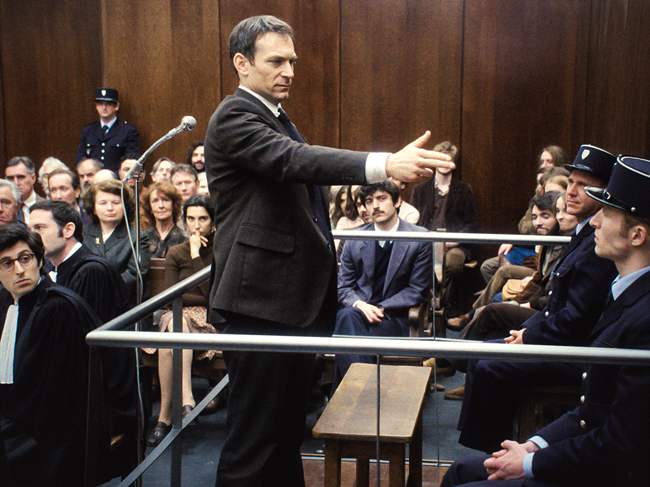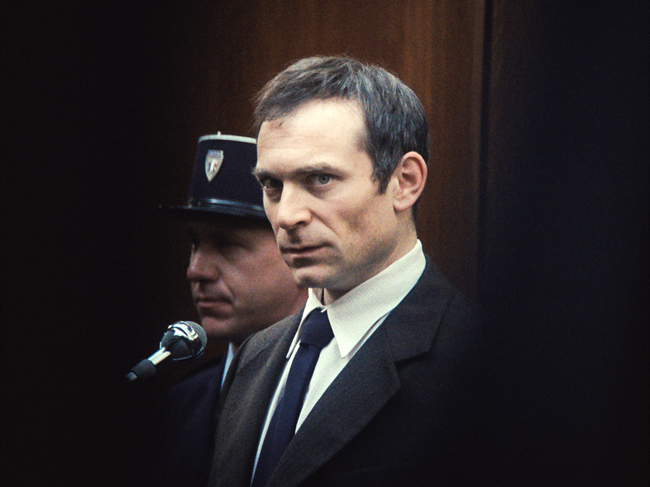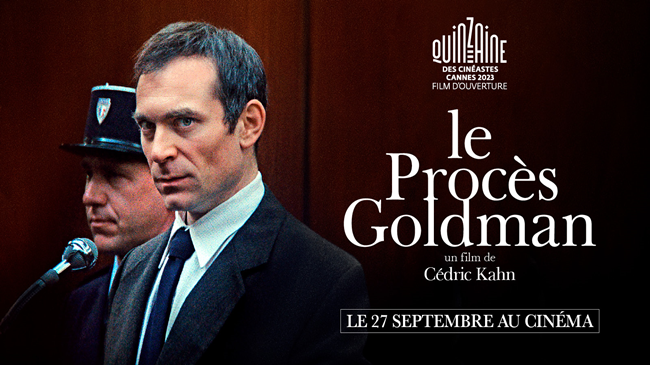Film Review: Le Procès Goldman
- SUBSCRIBE
- ALREADY SUBSCRIBED?
BECOME A BONJOUR PARIS MEMBER
Gain full access to our collection of over 5,000 articles and bring the City of Light into your life. Just 60 USD per year.
Find out why you should become a member here.
Sign in
Fill in your credentials below.
Like the recent Anatomy of a Fall, Le Procès Goldman (The Goldman Case) is a courtroom drama about a murder. In the former, the defendant is a German living in France, while the latter is about the son of Polish WWII survivors, who calls himself a “Polish Jew born in France.” Both treat the ambiguity surrounding an unnatural death. While I felt satisfied after watching Anatomy that I’d picked up insights into the French legal system and the predicament of a foreign resident, Le Procès Goldman left me uneasy, although the film, which takes place almost entirely in the courtroom, is riveting from start to finish.
Who was Pierre Goldman? Though a long-time French resident, I’d never heard of him. What struck me was that he was the half-brother of Jean-Jacques Goldman, a pop-rock icon, and friend of Régis Debray, a one-time revolutionary and comrade-in-arms of Che Guevara. Goldman was a man of the left, whose parents were dedicated communists (his mother was expelled from France and lived out her life in Poland). He was a bully-boy for extreme-left student groups, then active as a militant for radical organizations. He went to Bolivia along with Debray, and also to Cuba. And then … ?

Le Procès Goldman © Moonshaker
Many militants, like Debray, reintegrated normal life, led comfortable lives and entered the French elite. Goldman was at the opposite extreme. Unstable and violent, his life spiralled into so-called banditisme. He confessed to robbing several shops, and never retracted the confession. But why did he commit the robberies? In the 1980s, radicals from the Black Liberation Army and Weather Underground committed a robbery of a Brink’s truck that turned into a bloody botch, but was clearly meant to finance their “resistance movement.” Goldman seems to have acted alone. Did he too mean to restart the revolution? Unfortunately, the director, Cedric Kahn, doesn’t seem interested in exploring the question.
Instead Kahn, like Justine Triet with Anatomy, shows us the workings of a French courtroom. It seems like both ritual and theater of a curious sort. Lawyers question witnesses and then abruptly turn to the defendant to pose a question. At one point a juror expresses an opinion. Spectators erupt to support one side or deride the other, oblivious to the president of the panel of judges. It’s fascinating to watch, so different from an American trial. However, we have only one person’s view of the proceedings, the director’s.

Le Procès Goldman. ©-Moonshaker
Kahn films cleanly, with an assured hand, and brings out brilliant performances from the actors, even those in minor roles. The movie is dominated by Arieh Worthalter as Goldman (he was also in Serre Moi Fort, directed by the actor Mathieu Amalric, and Vincent Paronnaud’s Hunted). His constantly changing moods, punctuated by moments of glum stillness, make for a positively bipolar performance.
There are two dramatic movements in the film. Witnesses, including passersby (an off-duty policeman who was shot), and the relative of a shop employee, give incriminating eye-witness testimony about the scene of the two murders. On cross-examination, Ten Angry Men-style, they admit to inconsistencies and deficiencies in their accounts. This makes us appreciate how cloudy any testimony can be: Imagine going about your everyday life when a crime happens unexpectedly, shockingly. Few of us are ready to mentally record the goings-on.
Secondly, the attorneys, both defense counsel and prosecutors, indulge in histrionics of the type that in American proceedings tend to take place during the closing arguments. These theatrics often seem dubious. Does Kahn take a skeptical view of how a trial can degenerate into spectacle? I thought he might, but the many reaction shots, showing spectators affected by one rhetorical flourish or another, seem to be taken at face value. It’s as if the lawyers are telling the public how to feel, and then the director is instructing us on how to feel.
We’ll never know the truth about the murders, but I began to suspect Goldman was guilty, with the extenuating circumstance of his mental state. A psychiatrist testifies that he had psychotic episodes (though not a full-blown psychotic). He himself speculated while talking with police that he might have committed the murders, but repressed the memory. It would have represented the ultimate botch, as in the Brink’s case, and also the betrayal of his life’s cause, harming — killing — two members of the working class. The attorneys don’t probe this angle, and neither does the director.

Le procès Goldman. ©Severine-Brigeot
The legal points and politics get mucked up further by the ethnic and religious dimensions. Goldman’s chief counsel, Georges Kiejman (intensely played by Arthur Harari) is also of Jewish immigrant origin, and though determined to keep this out of it, another defense lawyer convinces him to incorporate his background into his closing argument, to lend it empathy. This provides the human drama otherwise lacking because of Goldman’s insistence on excluding all emotion outside of anger, but it also blurs the facts (there Goldman was correct).
The most moving performance is that of Chloé Lecerf as Goldman’s wife. This is surprising, as her testimony is short, and the most moving shots are of her silent face and poignantly expressive eyes. Christiane Goldman was from the French Antilles. Though he didn’t take up the political cause of the Antillais people, Goldman adopted their culture, in particular, music. According to Ivan Jablonka, author of Goldman, a biography of Jean-Jacques Goldman, his half-brother Pierre loved Latin and Caribbean dance, and met his wife through contacts in Antillais nightlife. Was this innocent passion, political solidarity, or alienation — not only from France but his own origins?
There’s a rich, if troubling, story in Pierre Goldman’s personal life. Jean-Jacques’ biographer referred to the half-brothers’ relationship as “fratricidal.” Jean-Jacques gravitated to pragmatic socialism, while Pierre remained loyal to the far left. Jablonka told me that a letter from Pierre to Jean-Jacques condemns pop and proclaims that the only defensible music is James Brown and soul. Kahn, showing Pierre Goldman-like stubbornness by confining us (and himself) in the courtroom, gives a performative version of the facts rather than the whole truth. He admits in a disclaimer (conveniently at the end of the film) that he changed certain accounts and dialogues. Goldman’s wife has complained about words he put into her mouth. He refers to Goldman’s own murder as unresolved, though rightist militants admitted to the crime. To treat an ambiguous subject is one thing, but to be willfully ambiguous yourself is something else.
Production: Moonshaker
Distribution: Ad Vitam Distribution
Lead photo credit : Le Procès Goldman poster ©Advitam Distribution
More in cinema, film review, movie




